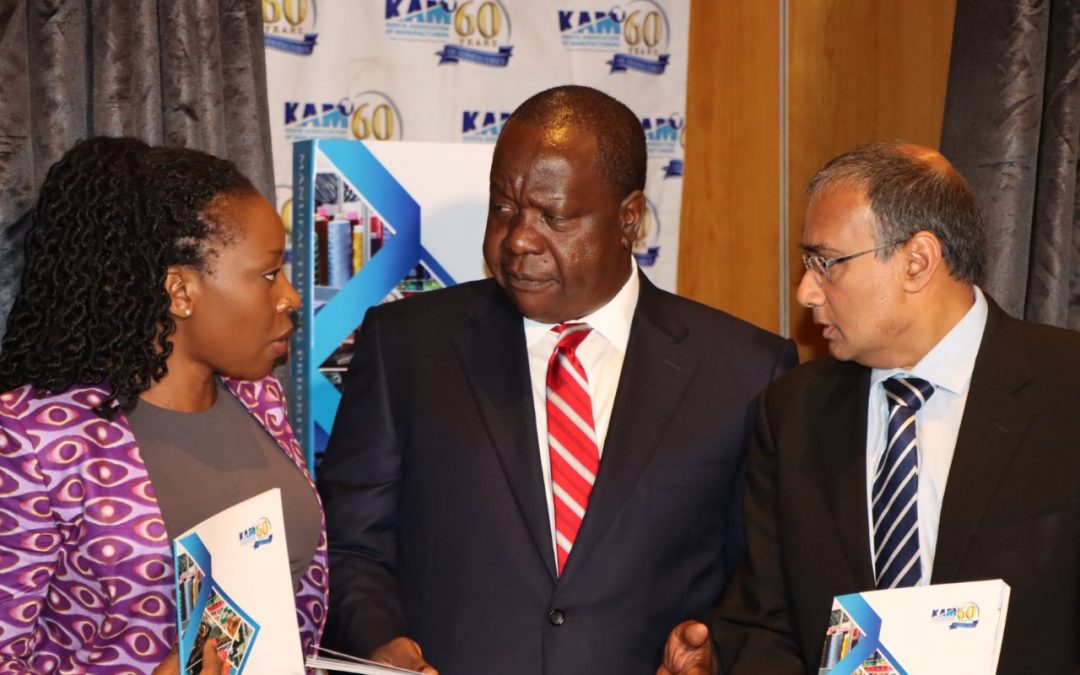Kenya Association of Manufacturers (KAM) has today launched the Manufacturing Priority Agenda (MPA) 2020. The MPA highlights immediate action plans to establish a competitive manufacturing-led economy for job and wealth creation.
Speaking during the launch, Cabinet Secretary for Interior and Coordination of National Government, Dr Fred Matiang’i said that the government is working to streamline its operations to create a conducive business environment in the country.
“Previously, the need for approval from various agencies increased the cost of doing business and was an opportunity for rent-seeking. The one-stop-shop for service delivery for businesses will change this. We have also held engagements with county governments to harmonize county cess, fees and charges to reduce the cost of doing business amongst counties,” noted Dr Matiang’i.
He also said that currently, the government and private sector have the most responsive relationship in Kenya’s history, adding that, “We shall engage the private sector from the grassroots. It is also time that we worked together to promote ethical business practices for our country’s economic growth.”
The Chairman of the Parliamentary Committee on Trade, Industry and Cooperatives, Kanini Kega remarked that The National Assembly consistently develops and reviews policy and regulatory frameworks that enable economic growth.
“A conducive business environment is a critical aspect of sustainable economic growth. The National Assembly works to streamline the environment by developing policies that promote industrial growth. We are fast-tracking the signing of legislative acts to support the growth of manufacturing, “ said Kega.
KAM Chair, Sachen Gudka stressed on the need to urgently rethink our economic trajectory by making a swift about-turn to prevent further decline and stimulate growth.
“The country needs to create a space that provides the much-needed stimulus for industry to grow, become competitive and increase productivity. The 2020 MPA themed “Establishing a competitive manufacturing-led economy for job and wealth creation” is a how-to guide on how this space can be created, ” said Mr Sachen.
He added that Industry is currently operating in a very constrained fiscal environment adding, “If we are able to achieve at least 50 percent of industry asks this year, the change in the economy will be immediate and far-reaching. Progressive economic policies are meant to create an environment for industry to thrive, thus increasing government revenue.”
Some of the measures the Association is proposing, this year, to establish a competitive manufacturing-led economy include;
- Enabling stability of the macroeconomic environment. The National Treasury should sustain the ongoing fiscal consolidation measures and ensure that the fiscal deficit is reduced to 3{d59e984f9fbc5c09e4ab0305e27bfa5819922b7230cd324f89a660f78358ca33} of GDP in the 2022/23 financial year.
- Enhancing the competitiveness of locally manufactured goods. For example by reviewing SGR Freight tariff rates to make them competitive. The sector is currently at a 12.8{d59e984f9fbc5c09e4ab0305e27bfa5819922b7230cd324f89a660f78358ca33} cost disadvantage on most goods compared to our neighbouring countries. Last-mile costs need to be reviewed as they are a key factor in the increase of overall operational costs for businesses.
- Developing a pro-industry policy and institutional framework. The design of coherent and cohesive policies is key, between Government departments and also between the National Government and Counties. This will enhance effective and transparent policy execution
- Enhancing market access. Kenya needs to push for the finalization of the amendments on the NTB Act, advocate for ratification of TFTA by member states and fast track the finalization of an optimal EAC CET structure that will promote value addition and industrialization.

lisinopril 10 mg order online lisinopril 40 mg no prescription prinivil 20 mg
https://buyprednisone.store/# 50 mg prednisone from canada